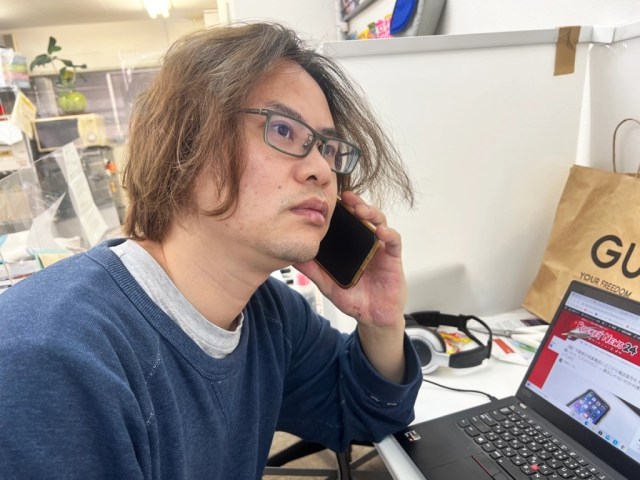“Hey, how’d you get our personal information?” we ask a Japanese telemarketer

They asked Seiji if he wanted to get into the real estate game, but Seiji wanted to know how they got his number.
Like a lot of people these days, our Japanese-language reporter Seiji Nakazawa primarily keeps in touch with friends and family through text messages and voice chat apps. If someone does call his actual phone number, it’s usually either a company or individual he’s reached out to while researching an article or someone trying to sell him something, and when his phone rang the other day, it was the latter.
“Hello, Mr. Nakazawa!” said the voice on the other end of the line, before introducing himself and giving the name of his company. Seiji had never heard of either of them, but for the purposes of this article, we’ll call the man Nishida from Company P. Company P, he said, was a real estate services provider, and he wondered if he might be able to interest Seiji in som–
“No, I’m not interested,” Seiji said, cutting Nishida off before he could waste any more of either of their time. “If I could just have a few moments to explain our system,” Nishida pleaded, and in fact Seiji did want to know about Company P’s system…but not the one by which they buy and sell real estate,
“How did you get my phone number?” Seiji asked.
We know it’s hard to believe, what with his massive 20-yen (US$0.17) royalty check from his side business as a recording artist, but Seiji is neither a wheeler nor a dealer in the real estate market, and he’s never hired the services of any sort of property development/investment firm.
▼ Seiji, seen here cooking his lunch on the hood of a car, does not lead a Rockefeller-esque life.

“I saw your name listed on our name list, and contacted you via the phone number it has for you,” Nishida answered. Of course, this just made Seiji want to know how Company P got the name list, and Nishida told him “We purchased it from a name list company.”
Seiji appreciated Nishida’s honesty, but each answer just led him to another question. Just like Seiji didn’t recall giving his personal information to any real estate investment companies, he also has no recollection of giving it to a name list company for them to pass off to Company P. Hoping to finally get to the bottom of the mess, he asked Nishida what the name of the name list company was, and this is where Nishida stopped being helpful. “I’m sorry, but our company does not divulge such information.”
That didn’t sit right with Seiji. Up until this point, he’d been warming up to Nishida, and even thinking that should he turn out to be the member of the SoraNews24 who finally does win the lottery, he might have Nishida broker the purchase of his villa. But now Nishida was blocking his attempt to find out more about the name list company, even though both Company P and the name list supplier knew more about Seiji than he was comfortable with.

So after Seiji hung up, his next phone conversation was with Ryo Furukawa, a lawyer with Tokyo’s Hirano Law Office. Isn’t what happened to Seiji a violation of Japan’s Personal Information Protection Law?
Unfortunately, it’s probably not, Furukawa informed him.
“Selling a name list with the entrants’ personal information, in and of itself, isn’t illegal,” Furukawa explained. “What you have here is a situation where one company supplied another with your personal information, and that second company contacted you using it, but it’s likely the process started with information you yourself willingly provided.”
While Seiji has never given his name and phone number to a name list broker or real estate investment firm, he has, of course, supplied that information to plenty of other businesses over the years that require customers to provide contact information or create user accounts. It’s not unusual, Yoshikawa explained, for such service contracts to include clauses stating that the customer gives consent for their information to be used in solicitation for specific products or services (such as real estate investment) or that it may be supplied to third party organizations. Sometimes there’s even a sneaky additional clause to the effect of “In the event that information is being suppled to a third party, your personal data will be withheld upon request,” but since Seiji would have no way of knowing about such an arrangement ahead of time, he wouldn’t have any way of keeping his name of the list.
As for Nishida refusing to reveal the name of the company that Company P had bought the name list from, that’s not illegal either. While companies are required to keep an internal record of where they obtained the information from, they’re under no legal obligation to divulge it just for the asking, even if they’re being asked by the person whose information it is.
With no evidence, or even implication, that a crime was committed, Seiji doesn’t have any real leverage to force Company P to tell him where they got his information from. Yoshida says, though, that that will change next year, when an amendment to the Personal Information Protection Law will go into effect, obligating companies to reveal their personal information sources if asked by the individual themselves, but for now, Seiji is pretty much out of options.
Well, except one, which is that right here and now he’s officially putting the word out that he’s not interested in any real estate investment pitches. So if you’re a telemarketer who’s reading this article, go ahead and cross Seiji off your name list right now, since calling him definitely isn’t going to land you a sale.
Photos ©SoraNews24
● Want to hear about SoraNews24’s latest articles as soon as they’re published? Follow us on Facebook and Twitter!
Credit:

0 comments: